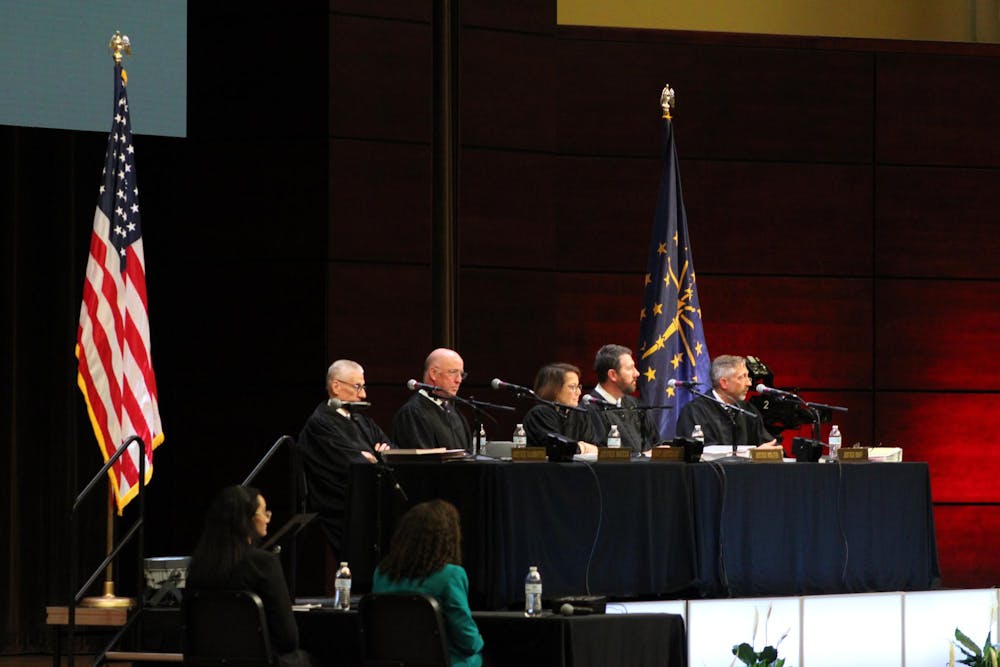The Indiana Supreme Court met to hear oral arguments in the Chapel Auditorium of Indiana Wesleyan University on Thursday, April 10.
The 40-minute grilling included arguments from the prosecution and defense of a civil case. The audience was made up of approximately 850 college and high school students from around Indiana.
The hearing will determine whether the Court takes up the case or returns it to the trial courts, the case summary said.
The cases, Oukbu v. Amazon, Inc. and Kaur v. Amazon, Inc., respectively involve the injury of a truck driver and the death of another after they both parked their tractor trailers in the turn lane of County Road 300 and exited their vehicles, confused about where to enter an Amazon fulfillment center across the road. While looking for the correct entrance, they were hit by oncoming traffic.
Two of the three entrances were marked with “no truck” signs. The drivers, Mahari Oukbu and Harvail Dhillon, had parked their trucks at the second “No truck” sign when they got out.
The Plaintiffs in the cases, Oukbu and Dhillon’s estate, sued Amazon for creating unsafe conditions that forced truck drivers to habitually exit their vehicles on that stretch of the road. They alleged that the two “no truck” signs were confusing and poorly lit, according to the appellees’ transfer request.
Defendants Amazon Inc. and CF Mount Comfort, which owns the property, requested a motion that would force the trial court to make a decision with the facts presented, arguing that the plaintiffs had no legal basis for their accusation.
The defendants argued that Amazon and CF Mount Comfort were not responsible for Oukbu and Dhillon’s welfare since both accidents occurred outside their property. Both trial courts granted the defendants’ motions and concluded that the defendants were not culpable, according to the case summary provided to students in attendance.
Both plaintiffs appealed the result to the Indiana Court of Appeals, which reversed the decision based on Restatement of Torts, Section 54 —a list of guidelines for lawyers and judges. Section 54 states that property owners have a duty to limit hazards on their property that could endanger individuals outside it, according to the transfer document.
The defendants asked the Supreme Court to weigh in.
Representative for Amazon Edward O’Brian argued that a landowner’s duty of care does not apply to those outside their property. He cited Reece v. Tyson Fresh Meats, which established that a landowner with tall grass in their yard could not be held liable for an accident on the abutting roadway because the obstruction was within the property line.
“Section 54… is manifestly inconsistent with this Court’s jurisprudence,” he said, referring to Reece.
He added that making Section 54 law would lay a heavy burden on Hoosiers who own property next to a public roadway.
Chief Justice Loretta Rush drew a sharp distinction between the outcome in Reece and the Court of Appeals’ decision. She said in Reece, the injured party was not an invitee, meaning the property owner had not invited them onto their property and thus couldn’t be held responsible for actions occurring off-site.
Adam Trueblood, representative for the plaintiff, said the Court should apply the Court of Appeals’ decision and extend the duty of care to people outside the landowner’s property.
“But how is it foreseeable,” Justice Mark Massa said, “that someone would stop their truck in the middle of the road and subject themselves to the danger that would… ultimately take their life?”
Citing eyewitness testimony, Trueblood said truck drivers stopped and exited their trucks at that spot in the road all the time, and that Amazon’s signage was the culprit.
When pressed on how a sign obliged Amazon to care for individuals outside its property, Trueblood answered that by telling drivers where not to enter, Amazon assumed responsibility for directing them to the correct entrance.
Rush asked Trueblood how far such a duty would extend. Would it apply to farm stands at the side of county roads?
Trueblood hewed closely to the language of Section 54 but added that the duty would be more applicable to larger operations.
Afterward Trueblood’s counsellor, Charles Hubley, gave a brief follow-up, and Neal Bowling, the petitioner for Mount Comfort, offered a rebuttal.
The Indiana Supreme Court transitioned into a question-and-answer period. Students and teachers lined up down the central isles, asking questions about anything unrelated to the case.




